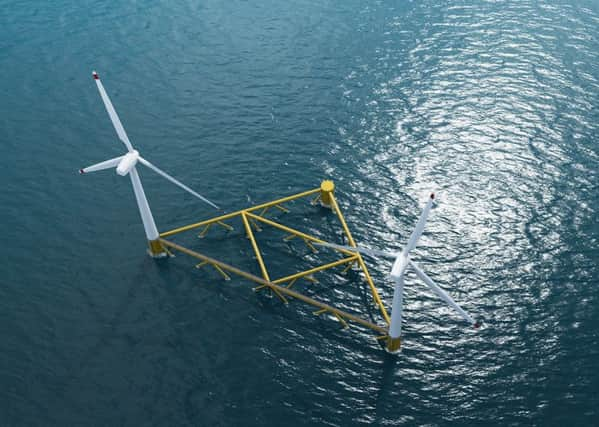Comment: Floating wind farm key to Scots sustainable energy


A new project, Dounreay Tri, proposed to launch off the Northern coast near Thurso, is a prototype facility that will pioneer the deployment of wind turbines in deep water and may lead the new generation of offshore wind farms.
Until now, it has only been possible to do so in relatively small areas of shallower waters, such as those off the East Coast. Some of these areas are extremely important feeding areas for seabirds, making them unsuitable for offshore wind development. Given the finite space for onshore wind farms, it is essential that we also look to deep-water offshore technology.
Advertisement
Hide AdAdvertisement
Hide AdSwitching from fossil fuels toward cleaner, low-carbon energy sources will help avoid the worst impacts of climate change on people and wildlife. The 2016 State of Nature Report showed that species such as puffins and kittiwakes are already suffering, and tidal habitats like saltmarsh are being lost as sea levels rise.
RSPB Scotland supports further development of low-carbon renewable energy in Scotland to help avoid impacts such as these. However, it is equally important that such schemes are located in areas that avoid harming our most special species and habitats. Poorly sited projects can harm birds, and damage habitats like peatlands, which store vast amounts of carbon in addition to providing homes to many species.
The Scottish Government will soon publish a ‘Scottish Energy Strategy’, aimed at securing the transition to low carbon energy - the first time we have had this kind of long-term plan for our whole energy system.
At a time of increasing policy uncertainty over UK Government support for renewables, and subsidy regimes, particularly for onshore wind and solar, offshore wind projects are particularly important, and Scotland should continue leading the way to what should be a fully green energy future.
RSPB Scotland will continue to work hard to make sure any such strategy can both be bold on emissions reductions and protect the natural environment that we all depend upon. Only by achieving both of these aims will our energy future be truly sustainable.
Innovation will also be key to delivering renewable energy, because technical advances can both increase production capacity while helping to further conservation.
For these reasons RSPB Scotland is supportive of the planning application that has been submitted for the Dounreay Tri project to install a multi-turbine floating wind-energy demonstrator off Dounreay. I t is thought the project would be a world first and, if it comes to fruition, the project would be an important precedent for the future of sustainable energy technology internationally. But it is potentially at the mercy of the bureaucratic process. The construction of the wind farm is being enabled by a legislative system that will expire by 31 March this year.
This gives Marine Scotland and Scottish Ministers a small window to seize the opportunity to put Scotland at the forefront of new technology.
Advertisement
Hide AdAdvertisement
Hide AdThe project symbolises Scotland’s energy renaissance. Sited offshore from the experimental Dounreay nuclear facility, which is still leading the world in decommissioning expertise, just at a time when much of the North Sea’s offshore oil and gas facilities are in or entering decommissioning phases, the Dounreay Tri project will help secure not just Scotland’s clean energy future but will also help Scotland remain at the forefront of global engineering expertise, whilst safeguarding our natural habitats - habitats which support internationally important seabird populations.
Floating offshore turbine technology, particularly in Dounreay, taps into Scotland’s long history of energy innovation. Indeed, while oil has historically given huge economic and social benefits to Scotland, in future years it will be carefully sited renewables that allow the nation to deliver its businesses and households a secure, sustainable source of power.
• Marcus Thor is Project Director for Dounreay Trì Limited and Aedán Smith is Head of Planning and Development, RSPB Scotland